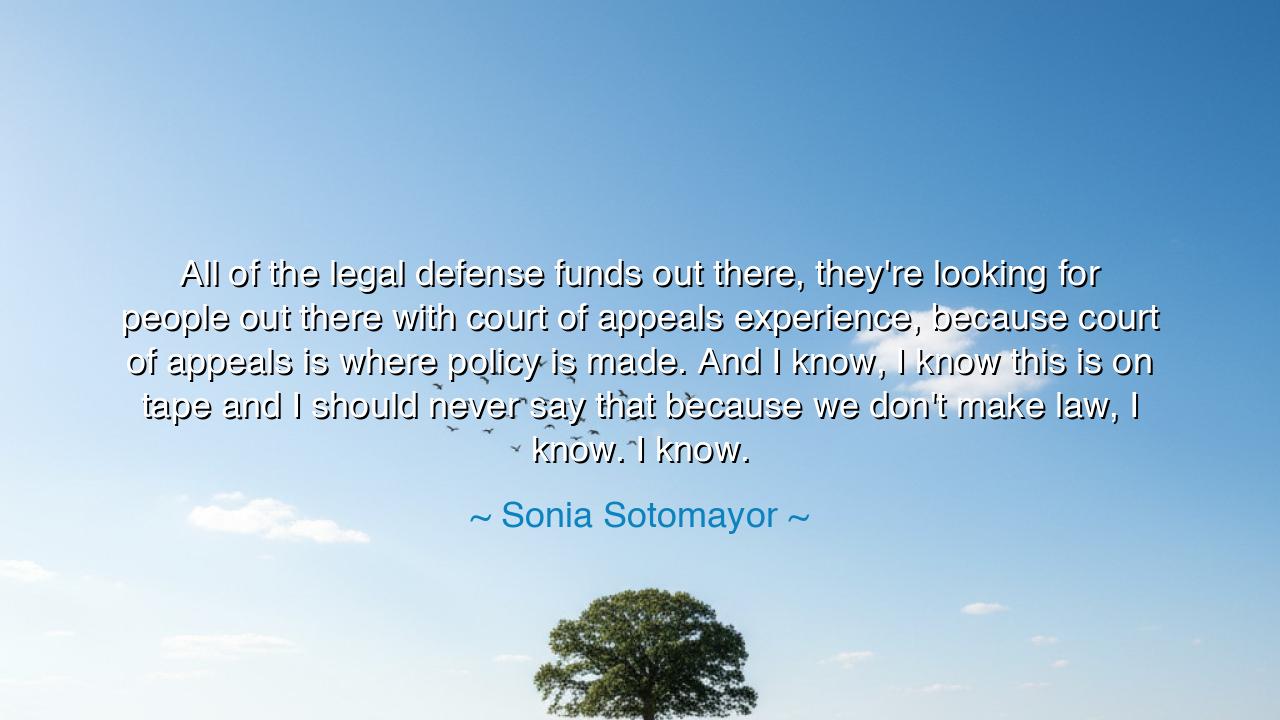
All of the legal defense funds out there, they're looking for
All of the legal defense funds out there, they're looking for people out there with court of appeals experience, because court of appeals is where policy is made. And I know, I know this is on tape and I should never say that because we don't make law, I know. I know.






Hear the candid and weighty words of Sonia Sotomayor, spoken before she ascended to the highest court of the land: “All of the legal defense funds out there, they're looking for people out there with court of appeals experience, because court of appeals is where policy is made. And I know, I know this is on tape and I should never say that because we don't make law, I know. I know.” These words, though spoken with humility and caution, reveal a truth often hidden: that the courts, though not makers of law in name, shape the path of justice through their rulings. In the court of appeals, where decisions ripple across many lives, policy is not written by legislatures, yet it is forged in precedent.
At the heart of her statement lies the recognition that the Court of Appeals is no mere chamber of routine. It is the crucible where the laws of the land are tested, interpreted, and given living meaning. Legislatures may write statutes, but it is the courts that breathe life into them, deciding how they apply in the varied struggles of human life. And when a ruling is made at such a level, it shapes the way law is practiced in every corner of the nation. Thus, Sotomayor’s words confess the hidden power of judges: though they deny the title of lawmakers, they wield the pen of precedent, which in practice has the same effect.
History provides us with examples aplenty. Consider the case of Brown v. Board of Education. It was not Congress but the courts that declared segregation in schools unconstitutional. That ruling, though grounded in the Constitution, remade the policy of an entire nation. And though Sotomayor humbly said, “I know we don’t make law,” the truth shines clear: the court’s interpretation became the living law, changing the lives of millions. In this, we see that the courts are not passive but active, shaping the nation with each decision they hand down.
Yet her words also reveal caution, even fear, for she knew such a statement could be seized upon by those who cry out that judges overstep their bounds. She repeated, “I know, I know, we don’t make law,” as if to reassure, yet she could not deny the reality: policy is made in judgment. The ancients would have called this the paradox of power—the ruler who insists he does not rule, yet whose word directs the lives of men. Judges may claim only to interpret, yet in interpreting, they shape destiny.
The wisdom of her saying is not to expose a scandal, but to awaken us to reality. For if courts indeed shape policy, then the choosing of judges becomes one of the most powerful acts in a republic. Their decisions, cloaked in the language of law, outlast presidents, outlast parliaments, and mold the society of generations. Thus, legal defense funds, as she notes, seek those who have stood in the court of appeals, for they know the true battleground of justice is not only in legislatures but in courts.
The lesson for us is profound: do not imagine that the making of law lies only in the halls of Congress or parliaments. Know that the courts, too, are builders of policy, and that their work can elevate or diminish the rights of the people. Citizens must therefore watch carefully, speak boldly, and demand judges of integrity, for the fate of justice rests as much in their hands as in any elected official. Law without just interpretation is tyranny cloaked in ritual.
Therefore, children of tomorrow, take Sotomayor’s words as a beacon of vigilance. Honor the courts, but do not be blind to their power. Demand from them humility, wisdom, and fairness, for their rulings shape the policy of nations. And if ever you stand before a judge, remember this: though they claim only to interpret, they are in truth the stewards of justice itself. To entrust such power is no small matter, and to neglect it is to surrender your future. Guard it well, for in the balance of law and judgment lies the destiny of all free people.






AAdministratorAdministrator
Welcome, honored guests. Please leave a comment, we will respond soon